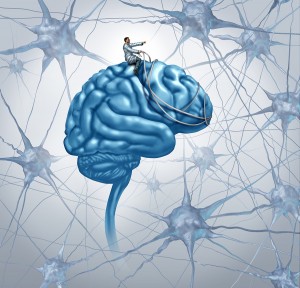 In a previous post, I discussed how hormones help keep the brain functioning properly. When all of the hormone-producing glands in the endocrine system are balanced and working together in unison, we tend to feel and function better.
In a previous post, I discussed how hormones help keep the brain functioning properly. When all of the hormone-producing glands in the endocrine system are balanced and working together in unison, we tend to feel and function better.
On the other hand, because hormones are the body’s chemical messengers, if one part of your hormonal structure is off, this will create a downstream effect on other hormones and negatively affect brain function.
Most people are familiar with the reproductive hormones – testosterone, estrogen and progesterone. But there are many hormones within the hormonal cascade that play an important role in the health of the brain and body.
As Dr. Daniel Amen illustrates in his book Change Your Brain, Change Your Body, the hormonal cascade is like a hormonal tree with a mother hormone at the top. All other hormones are derived from the mother hormone. Balancing the hormones at the top creates a cascade effect that balances the downstream hormones.
And what is the mother hormone at the top of the hormonal cascade? Cholesterol.
This is surprising to most people because we always hear about how high cholesterol levels can contribute to heart disease and other unhealthy conditions. However, when cholesterol is too low, it’s associated with severe depression and even suicide.
We need to be aware of how hormones impact our brain and our thinking. This starts by recognizing that we need cholesterol to make other hormones.
Hormone imbalances lead to cloudy thinking, weight gain, acne, wrinkly skin, decreased energy, bad moods and an increased risk of disease. When hormones are in sync, we have less brain fog, a slimmer body, clearer skin, more energy and a happier outlook.
For example, you may have heard people who are overweight say that they have an under-active thyroid. There’s truth to that.
The thyroid, a butterfly-shaped gland in the lower neck, makes a hormone that regulates your metabolism. This allows your body to work faster or slower and affects how we burn calories.
When your thyroid hormone is low, your body is sluggish. Your heart rate is slower. Your bowel movements are slower. Your digestive rate is slower. Your thinking is slower.
Many studies on hypothyroidism have shown overall low function in the brain, which can lead to depression, cognitive impairment, anxiety, mental fog, fatigue, weight gain, dry skin and low body temperature.
Most people think our hormone-producing glands are the sole source of our hormonal problems. For example, when a woman approaches menopause, many doctors only look at the ovaries. And when thyroid levels are off, many doctors only test and treat the thyroid gland.
That’s the wrong approach. Hormones are all working together to maintain balance.
The balancing of hormones requires analysis of not only the thyroid’s blood chemistry, but analysis of all hormones in the body. They’re working together as one orchestra.
This often requires dietary intervention. A gluten-free diet and supplementation are often helpful for low thyroid hormone, along with the right type of exercise, plenty of sleep and low stress.
If we’re going to change our behavior in order to transform our bodies, we need to understand how important hormones are to this process. It all starts with the brain, that miraculous three-pound organ that rests between our ears and conducts the orchestra of hormone-producing glands in the human body. Keeping that orchestra balanced is essential if we want to feel and function better.
 Dr. James Proodian is an accomplished chiropractic physician and health educator who founded Proodian Healthcare Family of Companies to help people feel better, function better, and live longer. His expertise for the past two decades has been in physical rehabilitation, and he has successfully established himself as a spinal specialist. In his practice, he advocates the science of functional medicine, which takes an integrative approach to treating patients by addressing their physical, nutritional, and psychological needs. Alarmed by the escalation of complex, chronic illness in our country, Dr. Proodian has been speaking to companies and organizations through his “Wellness at Work” program since 1994, motivating thousands of people to make positive lifestyle choices and lead healthier, more productive lives. He can be heard weekly on his radio program, “Proodian Healthcare By Design,” on Tandem Radio.
Dr. James Proodian is an accomplished chiropractic physician and health educator who founded Proodian Healthcare Family of Companies to help people feel better, function better, and live longer. His expertise for the past two decades has been in physical rehabilitation, and he has successfully established himself as a spinal specialist. In his practice, he advocates the science of functional medicine, which takes an integrative approach to treating patients by addressing their physical, nutritional, and psychological needs. Alarmed by the escalation of complex, chronic illness in our country, Dr. Proodian has been speaking to companies and organizations through his “Wellness at Work” program since 1994, motivating thousands of people to make positive lifestyle choices and lead healthier, more productive lives. He can be heard weekly on his radio program, “Proodian Healthcare By Design,” on Tandem Radio.